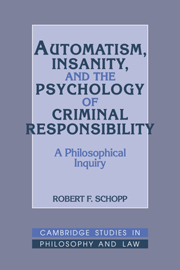2 - Problematic defenses: Insanity
Published online by Cambridge University Press: 07 October 2009
Summary
The psychological dysfunction of the defendant plays a central role both in the automatism defense and in the defense of not guilty by reason of insanity (NGRI). The unsettled state of the law regarding these two defenses illustrates the uncertainty regarding the current system of offense elements and defenses discussed in Chapter. Courts and legislatures have encountered difficulties in formulating and applying these defenses, but more fundamentally, the theoretical justifications for these defenses and their place in the larger system of offense elements and defenses remain unclear. Familiarity with the primary controversies regarding the NGRI defense will provide helpful background for the discussion of automatism; for that reason, Chapter 2 will examine the NGRI defense and Chapter 3 will address automatism. Two recurring issues regarding the NGRI defense warrant attention for the purposes of the book. The first is the constant search for a satisfactory NGRI formulation, and the second is the status of the defense in the structure of offense elements and defenses.
THE SEARCH FOR A SATISFACTORY STANDARD
The historical pattern of development of the NGRI defense has been discussed repetitively elsewhere. That discussion will not be repeated here. Rather, I will sketch briefly the four common NGRI tests in American law, and then examine more closely the most recent developments in the ongoing search for a satisfactory formulation of the NGRI defense.
Four NGRI standards have dominated the history of the defense in the American Law.
- Type
- Chapter
- Information
- Automatism, Insanity, and the Psychology of Criminal ResponsibilityA Philosophical Inquiry, pp. 27 - 70Publisher: Cambridge University PressPrint publication year: 1991
- 1
- Cited by

